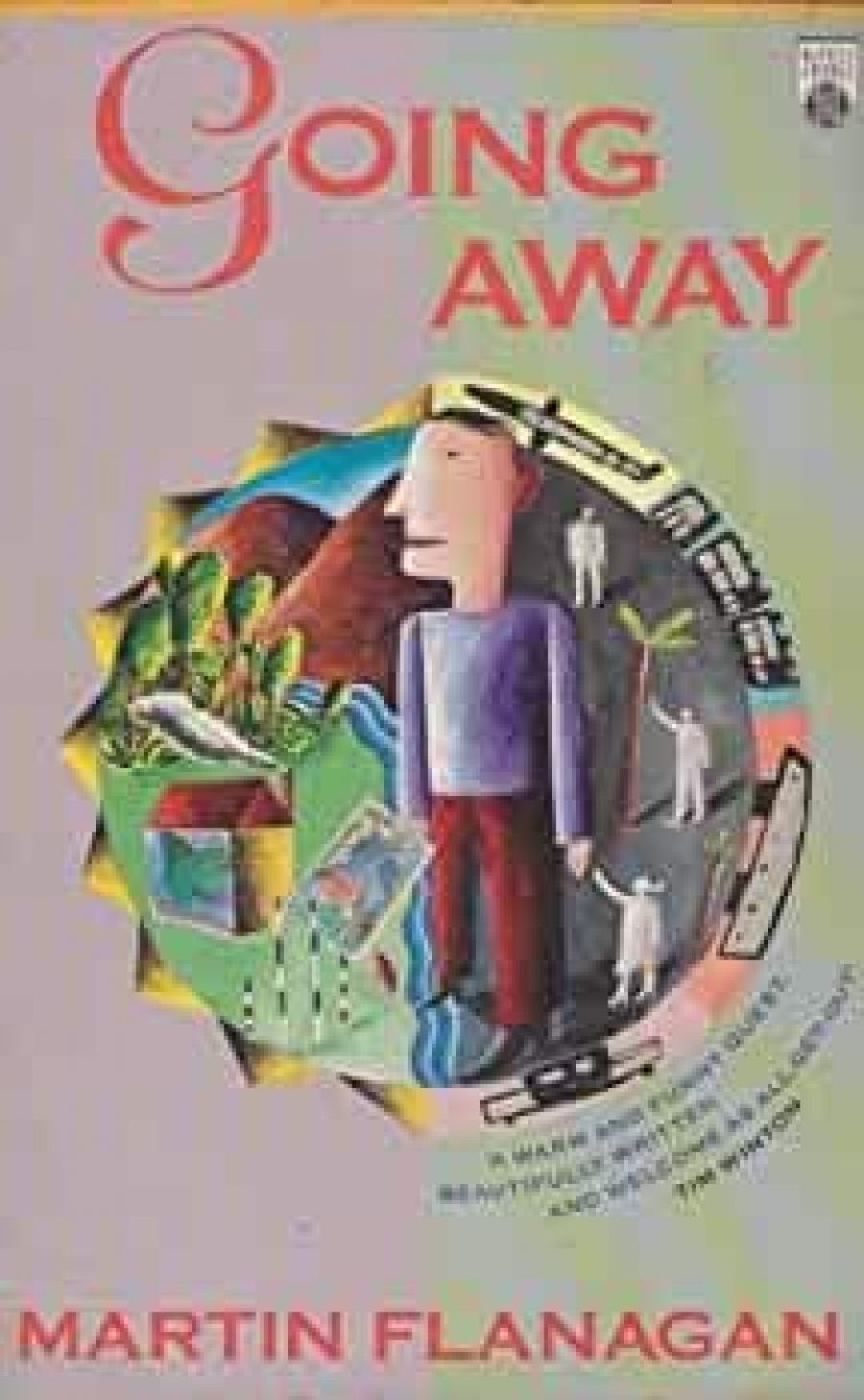
- Free Article: No
- Contents Category: Fiction
- Review Article: Yes
- Article Title: A tree to hang it on
- Online Only: No
- Custom Highlight Text:
Martin Flanagan, well-known contributor to The Age newspaper in Melbourne, has written a peregrinatory first novel in which the narrator, Stephen, is hoping to find the connection he feels he doesn’t have with his own land, and consequently with himself.
‘Somewhere’, Stephen says, ‘there had to be a combination of words that could slow down the world long enough for me to get a look inside, to prove that I existed.’
- Book 1 Title: Going Away
- Book 1 Biblio: McPhee Gribble, $18.95pb,
‘Somewhere’, Stephen says, ‘there had to be a combination of words that could slow down the world long enough for me to get a look inside, to prove that I existed.’
Stephen is a Tasmanian, one of several children in a closely-knit, endearing Catholic family. He shows early talent as a writer, and is encouraged in particular by an older brother. Like many young Australians, Stephen yearns to travel. When the novel opens, he is already away-he is, in fact, being threatened by a drunken man in a hostel in France.
This is the first of many vignettes in Going Away. Stephen finds good value in his travelling companions, such as the volatile Sapphire MacIntyre from Glasgow, and Turner, artist and writer, who has sent a package containing three novels and sixty-five short stories to a publisher in Australia. (Would a publisher really return such a package unopened, as Stephen is convinced?)
I like Flanagan’s careful shaping of his novel. Stephen’s quest is not strictly linear in the traditional way of quests, but rather circular. Each time around reveals something new before the novel moves on. Opening in France, and dipping back into Stephen’s childhood and harrowing school years along the way, the novel returns about half-way through to its starting point, the hostel in France. Stephen actually travels first to Ireland, then to England, the Hebrides, France, Russia, Germany, Africa and, finally, home. He realises that he is not, as he feared he might be, the same person as the one who set out, but a young man with a new sense of direction.
Back in Tasmania, Stephen the aspiring writer says, ‘I’d connected every bright idea I’d had while I was away, stringing them together like a set of Christmas lights. What I lacked was a tree to hang them on.’
Well then, has Flanagan found the right tree? Does it work as a novel, this rush of places and people?
For this reader, not entirely. While I admire Flanagan’s adventurous in his chosen form – and some passages are shining epiphanies that cast light well beyond themselves – for me there are also sections where there are just too many passing characters and flat incidents to recreate the ambience that the author has obviously hoped for.
Sometimes, in order to give events and meetings a significance beyond themselves, Flanagan’s writing strains after effect and topples over into banality. Summing-up comments are often gratuitous and sound rather like something Clive James would say. Some judicious editing would have helped.
An example occurs in one of the best passages in the book, which begins: ‘Sometimes, all I wanted was a woman. Sometimes, I thought that’s what the journey was, that and nothing more. On Aranmore Island, a woman called to me from the dark.’ The reader smiles wryly on learning that, in response, Stephen ‘spun around and said something absurdly polite’ – and went on his way. It is one of those moments we remember all our lives and wonder about, fantasise over, tell ourselves ‘if only’. Unfortunately, Flanagan feels compelled to include the following redundant, over-written, jarring sentence: ‘There was an instant when it was safe between us, but some new initiative was required and our daring was exhausted; we moved apart like partners in a dance of macabre intent.’ What does safe mean here? And what is the ‘macabre intent’?
This criticism isn’t just nit-picking. Going Away has such a delicate edifice that it stands or falls on such infelicities.
On the whole, though, I enjoyed the novel. It kept me reading in spite of irritations, and it provided some memorable moments. The Aboriginal man in a New South Wales country pub, for instance, with whom Stephen has a brief but crucial conversation before he sets off overseas. And the old man on Aranmore, who quizzes Stephen about himself, and then to all Stephen’s questions replies, ‘It is a lovely day ... Aye, a lovely day it is.’


Comments powered by CComment